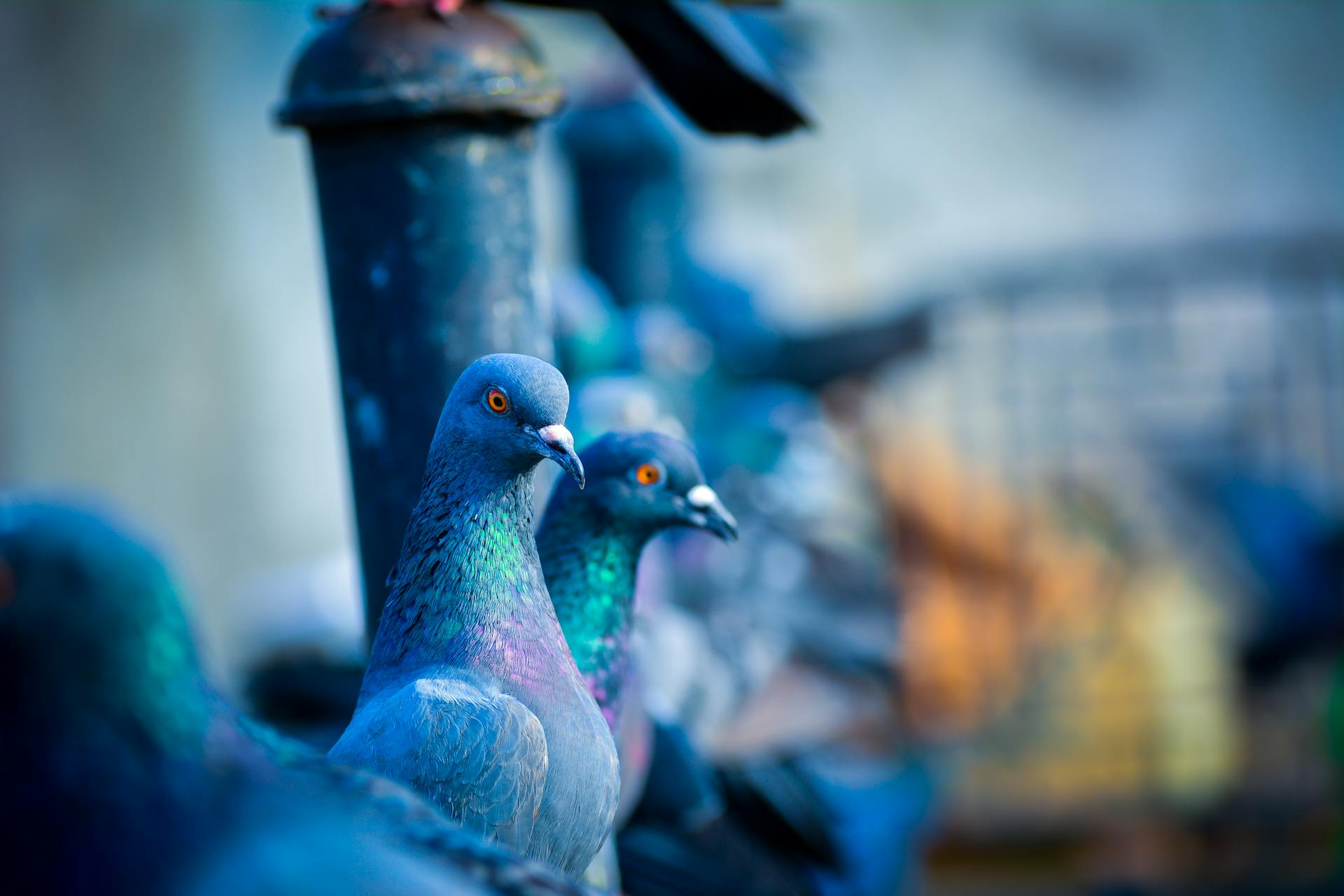
As a wild animal, squirrels spend their lives navigating the sights and sounds of their natural habitats. However, smells may have an even more important role in guiding them toward their food sources or away from danger. While there is relatively little research on the topic, some studies suggest that certain scents act as warning signs for these furry rodents.
To start off, it appears squirrels can’t stand with the smell of peppermint oil. Studies have shown that when this substance is diffused around where they live or feed, they will quickly scatter away from the area. Similarly, cloves and mustard are both highly odorous spices that elicit a negative reaction from squirrels; again causing them to act defensively by fleeing the region in question.
Scents like vinegar and onions also appear to make squirrels highly uncomfortable due to their strong smell profiles; causing them either ignore food sources near these odors or engage in behavior such as digging furiously around an appetizing morsel if one was hidden beneath an onion’s surface treatment! It goes without saying science has yet to definitively prove many of these facts but anecdotal evidence accumulated over decades has given us pretty good insight into what our furrier friends really hate!
If this caught your attention, see: Poop Smell
What noises do squirrels dislike?
When it comes to noisy disturbances, there's no doubt that squirrels are one of the most sensitive to sound of all animals. In general, sounds that may not be particularly loud or disruptive to humans can be quite unbearable for our furry friends. So, if you're looking for noises to deter squirrels from your property, the following are some of their biggest dislikes.
One noise squirrels find incredibly annoying is a hose or sprinkler system that sprays in their direction. Their small frames may not seem like much of an obstacle against the stream of water, but they absolutely despise it. A fast-moving and unpredictable spray can often cause them to go into shock and panic - prompting them to flee right away!
Loud noises are also a major nuisance for these critters - they absolutely abhor any loud banging or clanging sound coming from nearby human activity. This could mean anything from construction noise and car engines revving outside a window, sirens going off at unexpected times throughout the day or an electronic bug zapper being triggered somewhere in your yard. For this reason, using bug zappers is not always recommended when living near wildlife as it multiplies sounds 10 fold compared with traditional insect control methods.
Foghorns are yet another issue for many species - including squirrels - as these peeps have extremely sensitive ears which will generally pick up on all sorts of high-pitched frequencies quickly and efficiently! Because foghorns can get pretty loud during operation (reaching up close 1 million Watts!), they're definitely one thing our four-legged friends do not want coming near their homes!
Lastly – potentially more dangerous than any other type of disturbance – fireworks tend to create uncontrollable fear in many types of animals (*including our little bushy tailed ones*). Not only do explosions give off massive booms which never fail to frighten away nervous prey species like rodents & birds…they also create blasts powerful enough that some smaller wild animals might even suffer physical harm directly due heat waves alone!
In conclusion – it is clear why any type(s) of noises resulting in excessive disruptions should be taken seriously by those who live among such creatures; as doing so can drastically improve living conditions between human beings & otherwise scared critters alike (all without causing pain anywhere along the line!).
Curious to learn more? Check out: How to Clip Cat's Nails When They Hate It?
What colors do squirrels not like?
Squirrels don't have much in the way of color preferences; they have no inherent color bias, so to speak. That said, there are some colors that are not ideal for a squirrel's survival and comfort.
First and foremost, bright colors tend to attract attention. This can be dangerous for a squirrel if it’s trying to go undetected in its environment—it may end up becoming vulnerable to predators or other threats! Squirrels generally prefer more neutral colors like brown and gray that will help them blend into their surroundings.
Next is loud patterns or combinations of bright colors. Though colorful patterns may look aesthetically pleasing from the human perspective, these types of garish visuals can actually be quite drastic on a squirrel’s sensitive eyesight—such garish motifs may scare away potentially helpful neighbors like birds or distract them from foraging among vegetation where food is found!
Finally, dark earthy tones like black can signify danger in nature. Even though few predators hunt for squirrels specifically (most larger animals eat whatever is easy enough to capture), it's best if they tread lightly when encountering something that might trigger instinctive fear responses (like bogeyman type black beasts). Because of this, the darker shades should be avoided if possible so as not to create an unwelcoming atmosphere unnecessarily!
What foods do squirrels avoid?
It may surprise you to learn that, contrary to popular belief, squirrels aren’t sure of all the foods they should be avoiding. In most cases, their instincts are telling them which foods are safe to eat and what they should stay away from. However, some research has been done on which foods a squirrel will avoid.
One food that squirrels tend to steer clear of is highly processed snacks and sugars like chips or candy bars – although it’s not unheard of for a particularly brave or hungry one to take a chance at a snack bar that may have made its way into their territory! In general though, they tend to avoid these types of items as they lack essential nutrients that help keep them healthy and active.
Hoarding animals by nature, nuts hold special significance for many species of tree-living rodents – but not all species favor the same nuts. Peanuts seem to be particularly charming for both humans and chipmunks alike; however the only variety ground squirrels avoid is unshelled varieties due mainly in part because shelling can take more energy than it offers in return!
Staying true with their herbivores diet profile acorns are another nut (though technically classified as a seed)that get the thumbs-up from your typical forest-dwelling Squirrel subspecies while other less commonly courted nuts include chestnuts and hickorynuts. The plentiful benefits in terms of providing hydration makes them one food squirrels can't—and shouldn't—avoid altogether! Plus, seeds absolutely must shelled before chowing down if we hope for any nutritional benefit whatsoever…which means more labor intensive meals as much as nutrition bars might sound appetizing!
Although tucking into plants seems like an obvious choice for most herbivores including deer -- animal sources such as eggs or even scavenging dead birds isn’t out of the question when needed on occasionparticularly during times when resources become sparse; therefore leaving those caterpillar carcasses alone unless you would like eggs invading your backyard next summer... So -bon appetit!
You might like: Hate Food
What kinds of objects do squirrels stay away from?
When it comes to the question of “what kinds of objects do squirrels stay away from?”, the answer is quite varied and depends on the dynamic between a particular squirrel and a particular object. Generally speaking, there are certain items that all wild squirrels share an aversion for. Firstly, loud noises – such as fireworks or thunder – can be a major deterrent to wild squirrels. Squirrels also tend to stay away from large predators such as foxes and cats. Furthermore, they may also feel intimidated by commonplace household objects like brooms or rakes that move erratically through their territory. Ultimately, anything unfamiliar may make them feel threatened enough to keep them away; including strange structures or plants in their environment.
Given this information it’s important to remember that when dealing with domesticated animals the story often changes drastically. This is due largely in part due to the domesticated animal becoming accustomed to humans – which ultimately results in less fear arising from stimuli that would otherwise appear intimidating or dangerous (like loud noises). In fact some domesticated animals may even find these features exciting!
Regardless of why wild versus domesticated animals approach objects differently - it is crucial for owners wishing to attract more wild squirrel activity into their yards avoid placing any items that could spook unsuspecting guests; especially if your goal is for them enjoy hanging out there!
What environments are uncomfortable for squirrels?
Squirrels are incredibly adapted to a variety of environments and can survive in climates all over the world, from tropical rainforests to the frigid tundra. With that being said, there are still some environments that these creatures may find uncomfortable or even dangerous, so it’s important to know which ones these are.
The most obvious one would be areas that are too hot for them. While squirrels live in warm climates, staying in an environment where temperatures reach over 90 degrees Fahrenheit for extended periods of time could cause dehydration or heatstroke. Humans easily cool down by sweating and taking off layers when it's hot out; squirrels don't have those resources so extreme heat could prove fatal if they aren’t given quick access to a source of water or shade.
Other uncomfortable environments for squirrels include areas with excessive human activity such as large cities and their surrounding suburbs. Since we alter landscapes so drastically with buildings, artificial lights can confuse them at night time and loud noises can startle them during the day—especially hounds used by hunters as they try to seek acorns buried by other animals! Additionally, pollutants like car exhaust can also irritate their fur-lined lungs resulting in unneeded health issues no one wants them to go through.
Last but not least is any environment full of dangers such as predatory animals like hawks or foxes which could lead to losing well-needed nutrients needed for hibernation come winter months! Cats may also prove troublesome since some proprietors let them bond freely throughout neighborhoods where bushy-tailed critters like our friendly neighborhood neighbor reside; if cornered there’s ultimately very little chance at escape since cats climb trees much better than rodents do (and we all know how fast felines move).
Whether you see one scurrying around your garden grabbing food or perched atop branches searching its surroundings—your local squirrel is far better off sticking close environments he/she knows best rather than venturing into something that may just be too much!
What predators do squirrels fear?
Squirrels may seem like cute, fluffy creatures, but there’s a hidden dark side to their lives - they face a wide range of predators in the wild. In fact, trying to avoid dangers and predation is one of the foremost concerns that squirrels have when it comes to survival. But just what kinds of predators do squirrels fear?
Perhaps the biggest natural predator squirrels worry about are raptors and large birds such as hawks and owls. These birds can easily carry squirrels away with just one sweep – though they usually hunt during early morning or late evening hours when visibility isn’t so great. As such, many ground-dwelling species of squirrel (like foxes) try to remain at ground level as much as possible during these times.
In addition, snakes are another common predator that many types of squirrel try to stay away from. Larger snakes such as rattlesnakes can easily take down an unsuspecting adult or young squirrel without too much effort – unless the little rodent is lucky enough to spot it first! Smaller snakes like king cobras pose less danger for full grown adult animals; but still represent a significant risk for young ones that aren't quite so powerful yet
Finally, some species also have smaller predators on their radar which includes foxes and other canine mammals like coyotes near urban areas too. With their speed and quick reflexes – not unlike our friendly neighborhood superheroes – these animals spend much of their time roaming around in search for food sources including rodents; with some even developing hunting tactics specific for small prey! All things considered, there’re plenty dangerous threats out there that our small furry friends need be constantly on alert about - no matter where resides location wise!
Featured Images: pexels.com


